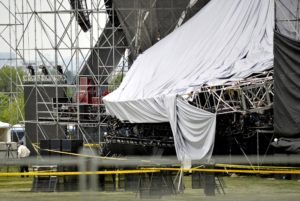Faithful readers of Adelman on Venues know that I believe one simple question is the first building block of risk management:
What could go wrong?
When I talk with friends (or lawyers) who don’t go to many events, they are amazed at the things people do at shows. They look at me, a sober, upstanding member of the community who seems to generally make sense, and they wonder how I can work in an environment where so many workers and patrons behave in ways they think are unreasonable. After I stop wondering what they do when they think no one is watching, I often take the opportunity to explain the legal duty of event producers to address reasonably foreseeable risks.
The issue is, what sort of behavior is foreseeable at live events? If workers are still taking unnecessary risks when putting shows together, how can that be changed, and who has the duty to do so? If patrons are known to indulge in substances (some sold at the show) that make dangerous choices more foreseeable, what should the producers do with that information? Put another way, if the foreseeable choices people make would be unreasonable in a different context, is there still a duty for event organizers to mitigate at least the risks in this context that are easiest to avoid?
I am attaching links to my thoughts on these important legal (and ethical) questions.

In the context of the death of a rigger at Coachella earlier this month and last week’s long-awaited conclusion of the investigation of Radiohead‘s fatal 2012 rigging collapse in Toronto, I contributed to the Event Safety Podcast‘s wide-ranging discussion of workplace safety. I think you’ll find this worthwhile listening.
In a different aspect of behavior that is foreseeable at events, but which most people would consider unreasonable, here is a link to an article about advances in the effort to prevent sexual harassment and violence at show sites.

Midway through the semester, one of my Arizona State University law students came up with the line that is the title of this blog. He had been struggling to reconcile behavior that seemed dumb to him, but was so likely to occur and so easy to fix that there was nonetheless a legal duty by the event organizers to address it. We concluded that the key was to put the word “unreasonable” in quotation marks. In the context of live events, one can scold workers or patrons for holding cavalier attitudes about safety — but there remains a duty to try to mitigate even dumb risks that are foreseeable.
Here is how this sober grown-up thinks about it. When people make mistakes, we don’t want them to die — we want them to learn.
